BEIJING—China’s housing market is expected to slow this year with sales forecast to drop, as Beijing steps up efforts to scrutinize banks and provincial governments to keep a lid on lending and prices, a Reuters poll showed.
China’s property market has provided some cushion for the world’s second-largest economy as policymakers try to revive the ailing manufacturing sector and restore flagging consumer confidence amid an escalating trade war with the United States.





